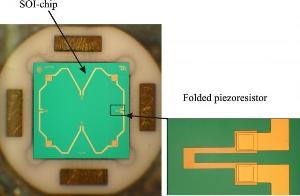Jun 20 2017
The Fraunhofer Institute for Reliability and Microintegration IZM has designed a high-pressure silicon-on-insulator (SOI) sensor that can monitor the exact pressure of many industrial processes, such as plastic extrusion, at temperatures of up to 400°C.
 Credit: Fraunhofer IZM
Credit: Fraunhofer IZM
The sensor is encased in a layer of silicon dioxide for complete electrical insulation. The outer SOL (Silicon-Over-Layer) on top of that layer includes independent piezoresistors in the silicon membrane.
The sensor, developed with input from the Technical University of Berlin, relies on SOI technology to work without any addition of oils or other liquids that more traditional sensors often depend on. Hence its input is not affected by any temperature effects on that liquid. By not requiring expensive and complicated filler technologies, the SOI sensor reduces the environmental impact of the system to become a genuine alternative for a future in which oil or mercury can be expected to be banned from many products.
To prevent environmental effects, the SOI chip is housed in a glueless ceramic body, attached to a steel membrane that is connected with a steel cylinder. The sensor is fitted neatly in a so-called ‘floating’ design: It floats in the casing between the electrical contacts, which avoids any need for additional filler. The SOI chip is connected to the case by wire bonding.
The research centre expects future high-pressure sensors to operate at temperatures of 600°C and beyond, which would call for the replacement of silicon, as it becomes self-conducting at more than 400°C.
Silicon carbide is on that roadmap as it retains much better electrical properties even at extreme temperatures.